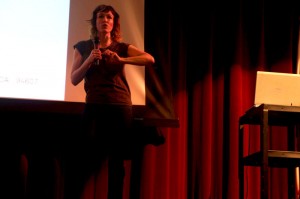
Anya Fernald, CEO and founder of Belcampo, believes aspiring farmers should go big rather than small. Belcampo is an California-based agricultural company that handles meat the old-fashioned way but on a larger-than-usual scale—20,000 acres to be exact.
While Belcampo is small compared to huge monocultural industrial farms, it is much larger than the Mom-and-Pop family farms, employing fewer than 500 people, Fernald said during her Keynote Thursday for this year’s This Way to Sustainability Conference.
The Keynote was held in the Bell Memorial Union Auditorium.
While Fernald supports small farms, she encourages farmers to work together and build large-scale projects.
“As a young person looking at embarking at a solo farming career, yeah, you can play in the cherry tomato business,” Fernald said, “But, you’re really not going to be able to be part of a bigger change, so I think consider working with friends too but also learning from people. That’s something that we’ve lost in our food system.”
The food system has also lost its focus, said Michael Dimock, the president of Roots of Change, an organization aimed to unify California’s sustainable food movement.
When food is treated as a commodity and agriculture as a business, food producers focus on providing cheap food and increasing their profits.
However, food is more than an item to sell—it is the basis of life, Dimock said. Now is the time for food producers to stand up and make solutions rather than contribute to social problems like obesity.
“The crisis of sustaining human civilization in a world of peak oil, global climate change, water and food scarcity, and peak population provides the context for agriculture to regain its rightful role as a core element in our national identity, particularly our state identity,” Dimock said.
Agriculture must regain this role through necessary, fundamental changes, said John Ikerd, a featured speaker and retired professor on agricultural economics.
Intangible experiences consumers will appreciate are Fernald’s focus. Her 1950s-style butchery takes customers back in time, allowing them to connect with times before industrial agriculture.
Her pasture-raised cattle who eat grass and roam pastures freely and Dimock’s idea to use beneficial insects to eliminate chemical use were other examples.
“We need the biological energy that comes from the living plants and the animals and other things of the earth,” Ikerd said. “And there’s too many of us on earth today to go back to hunting and gathering where we met our own needs from just hunting and gathering in nature.”
Yessenia Funes can be reached at [email protected] or @yessfun on Twitter.








